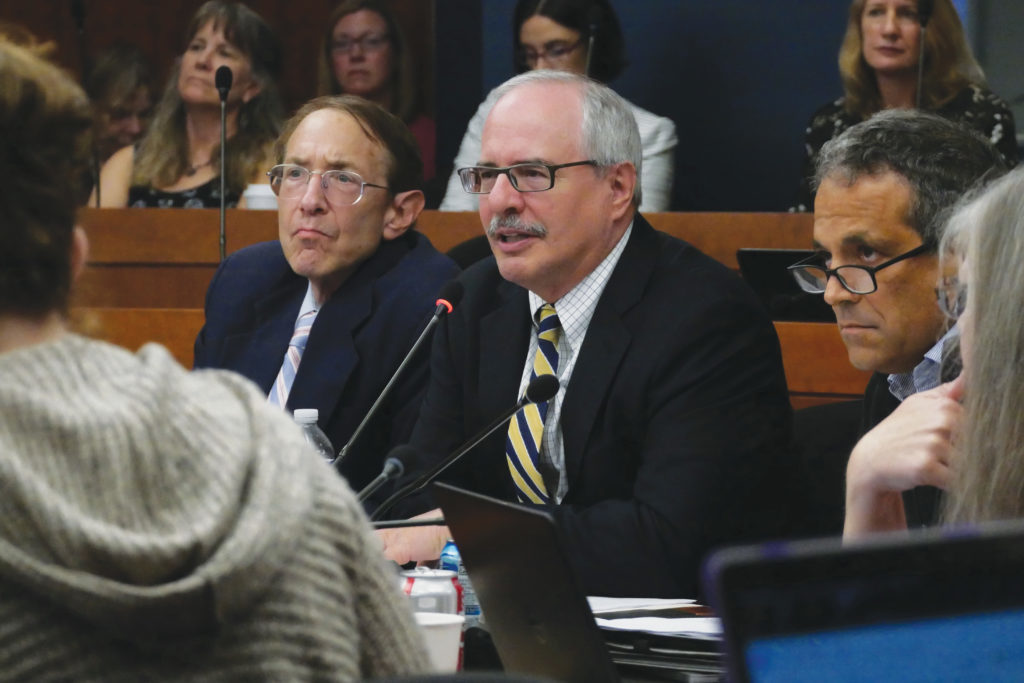University President Thomas LeBlanc’s framework for GW’s next strategic plan will prioritize student perspectives and include feedback from the GW community, officials said.
LeBlanc announced four pillars – distinguished and distinctive graduate education, high-quality undergraduate education, world-class faculty and high-impact research – as the “framework” for the University’s next strategic plan at a town hall meeting Thursday. LeBlanc said the four pillars form the “basis” for a “modern” university’s organization, administration and rankings.
“The breaking of our work up into those four areas, I think, made a lot of sense,” LeBlanc said in an interview. “It’s consistent with the structure of the University.”
He added that his five strategic initiatives – philanthropy and constituent engagement, student experience, research, medical enterprise and institutional culture – which he identified shortly after arriving to GW two years ago, set a “foundation” that complements the four pillars by pinpointing specific areas for improvement.
Four committees – one for each pillar – will gather input from the community, examine the current condition of their respective pillar and propose recommendations to the Board of Trustees by February. The committees are led by a faculty chair and vice chair and will be composed of undergraduate and graduate faculty, staff and student members.
“The five strategic initiatives, you could almost say, is the platform on which we can imagine doing planning,” LeBlanc said. “So I hope that much of the work of those committees can now be built onto the pillars.”
LeBlanc said at a Faculty Senate meeting Friday that the committee heads were selected by “academic leadership,” including the president and the deans of GW’s 10 schools.
He told The Hatchet that the committees are a “natural structure” for the planning process because they can examine each pillar with great detail. The board created an “umbrella” task force to oversee the committees and planning process, LeBlanc said.
Provost Forrest Maltzman, whose office recommended faculty for the committees, said the newly selected chairs and vice chairs are “excellent” and “experienced” leaders that bring expertise from around campus.
Scott Kieff, a law professor, will chair the “world-class faculty” committee; Gayle Wald, the American studies department chair, will lead the “high-quality undergraduate education” committee; Carol Sigelman, a psychology professor, will head the “distinguished and distinctive graduate education” committee; and Alan Greenberg, the epidemiology and biostatistics department chair, will supervise the “high-impact research” committee.
“I think the president has coaxed some great faculty to go ahead and step up to the plate,” Maltzman said.
He said LeBlanc and other top officials shortened the length of the next strategic plan from 10 to five years to force officials to “refresh” their plans as circumstances change. The University’s current 10-year strategic plan expires in 2021.
“One of his concerns in general with this is that a strategic plan has to be a living process, and it has to evolve,” Maltzman said. “So your option is to do a super long one and then over time, it might be more and more out-of-date.”
LeBlanc said students will sit on each of the committees, and Student Association President SJ Matthews will serve on the trustee-led task force. Matthews and Cissy Petty, the vice president of student affairs and dean of students, will work with officials to select the students for each committee, he said.
Matthews said she will accept applications to sit on the committees from the entire student body beginning Monday. Students who are not on the committees can also provide feedback by coming to her office hours, she said.
“I’m very excited to read these applications and to work with our student body to create a GW that works for them,” Matthews said in an email. “I want to ensure that all students at GW feel a part of this important process.”
LeBlanc encouraged the GW community at the meeting to provide feedback and suggestions about the plan through an online form found on the strategic plan’s new website.
Faculty involved in the planning process shared their eagerness to be involved and encouraged the community to provide feedback.
Jason Zara, the vice chair of the “high-quality undergraduate education” committee and an associate professor of engineering and applied science, said his committee has not yet met and its membership is still being finalized.
“I would like to share my enthusiasm for this venture as I feel very strongly that high-quality undergraduate engineering education is one of the core missions of GW,” he said in an email. “I am very optimistic that we will be able to use this strategic planning process to strengthen what I believe to be an already very strong undergraduate education experience.”
Scott Kieff, the “world-class faculty” committee chair, said he anticipates his committee will garner feedback through conversations with University staff, faculty and students. He invited any community member with feedback about the committee’s work to email him with suggestions.
“I invite anyone who’s part of our community to contact me at my law school email address with written input,” Kieff said. “I can assure anyone who provides constructive input that I will do my best to get it integrated into the committee’s thinking and transmitted through the committee’s work.”
Sigelman, the “distinguished and distinctive graduate education” committee chair, said she is glad to help lead the planning process.
“I am very pleased to have been asked to take on this important task and that our committee will do its best to analyze the current status of graduate education at GW and make recommendations to advance it in the next five years,” she said in an email.
Jared Gans and Parth Kotak contributed reporting.




